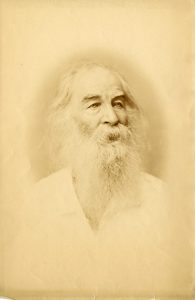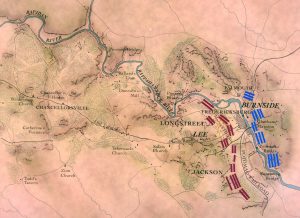Weekly Whitman: “To the Leaven’D Soil They Trod”

 Readers–the first Weekly Whitman came out at the end of October, and the last one is coming up soon. I missed several weeks in the hospital so there will not be exactly 52 entries, but these last ones have been chosen for specific reasons. “To the Leaven’D Soil They Trod” is illustrated by a map of Fredericksburg, but any map would do, old or new, digital or completely hand-drawn. Some folks laugh at the idea of something called a “Witness Tree,” but I think they are inspiring. The land that the battlefield trusts try to save is, indeed, watered with the blood of patriots, no matter which side you might claim as your own. If you don’t care for my map choice, find one you do like. Then spend some time with it, marking with your finger the places that are sacred to you. Then send some money to those who save battlefields–again, your choice. We must never forget.
Readers–the first Weekly Whitman came out at the end of October, and the last one is coming up soon. I missed several weeks in the hospital so there will not be exactly 52 entries, but these last ones have been chosen for specific reasons. “To the Leaven’D Soil They Trod” is illustrated by a map of Fredericksburg, but any map would do, old or new, digital or completely hand-drawn. Some folks laugh at the idea of something called a “Witness Tree,” but I think they are inspiring. The land that the battlefield trusts try to save is, indeed, watered with the blood of patriots, no matter which side you might claim as your own. If you don’t care for my map choice, find one you do like. Then spend some time with it, marking with your finger the places that are sacred to you. Then send some money to those who save battlefields–again, your choice. We must never forget.
To the Leaven’d Soil They Trod
To the leaven’d soil they trod, calling, I sing, for the last;
(Not cities, nor man alone, nor war, nor the dead,
But forth from my tent emerging for good – loosing, untying the tent-ropes;)
In the freshness, the forenoon air, in the far-stretching circuits and vistas, again to peace restored,
To the fiery fields emanative, and the endless vistas beyond – to the south and the north;
To the leaven’d soil of the general western world, to attest my songs,
(To the average earth, the wordless earth, witness of war and peace,)
To the Alleghanian hills, and the tireless Mississippi,
To the rocks I, calling, sing, and all the trees in the woods,
To the plain of the poems of heroes, to the prairie spreading wide,
To the far-off sea, and the unseen winds, and the same impalpable air;
… And responding, they answer all, (but not in words,)
The average earth, the witness of war and peace, acknowledges mutely;
The prairie draws me close, as the father, to bosom broad, the son;
The Northern ice and rain, that began me, nourish me to the end;
But the hot sun of the South is to ripen my songs.

Thank you for this great series, Meg. Hope you are fully recovered.
This series has been a constant joy to do. It has gained readership and–I hope–made others aware of how much Whitman has added to our appreciation of nineteenth century America. Thanks for reading.
Thanks for the series Meg.